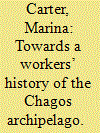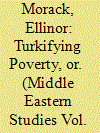| Srl | Item |
| 1 |
ID:
155754


|
|
|
|
|
| Summary/Abstract |
The article presents a critical investigation of the historiography of the Chagos archipelago and in particular the expelled islanders, known as Ilois, and more recently as Chagossians. A brief survey of the discovery and settlement of the atolls is provided, along with a more detailed summary of key events in the history of workers on the archipelago from the late-eighteenth to mid-twentieth century. Finally, the paper discusses the challenges of framing a workers’ history characterized by exploitation and marginalization alongside the romanticized collective representation of life in the archipelago which has been adopted as a ‘narrative of exile’ by the Chagossians.
|
|
|
|
|
|
|
|
|
|
|
|
|
|
|
|
| 2 |
ID:
164901


|
|
|
|
|
| Summary/Abstract |
This article shows that ‘Turkification’, a term widely used by historians of modern Turkey to refer to the forced transfer of property from Christian into Muslim hands, ought to be conceptualized not only in the sense of ‘enrichment’ but also, with regard to the working classes, as a process in which Muslim people inherited the poverty of their Christian predecessors. Taking İzmir as a case in point, the article first describes the plight of the overwhelmingly Christian working class prior to 1922. It then studies reports and editorials that discussed the economic and social situation in İzmir in the years 1923 to 1926, after the Turkish victory and forced migration of her Christian population. Over the course of these years, İzmir experienced a serious economic crisis, and bread prices reached levels that led to widespread undernourishment and hunger among the cityʼs poor. Agricultural production was lagging behind pre-war levels, and positive effects of ‘Turkificationʼ policies were failing to materialize. By analyzing the contemporary journalistsʼ attempts at explaining the crisis, but also pointing out national and transnational factors that they were probably unaware of, the article makes an original contribution to the economic and social history of early republican Turkey.
|
|
|
|
|
|
|
|
|
|
|
|
|
|
|
|